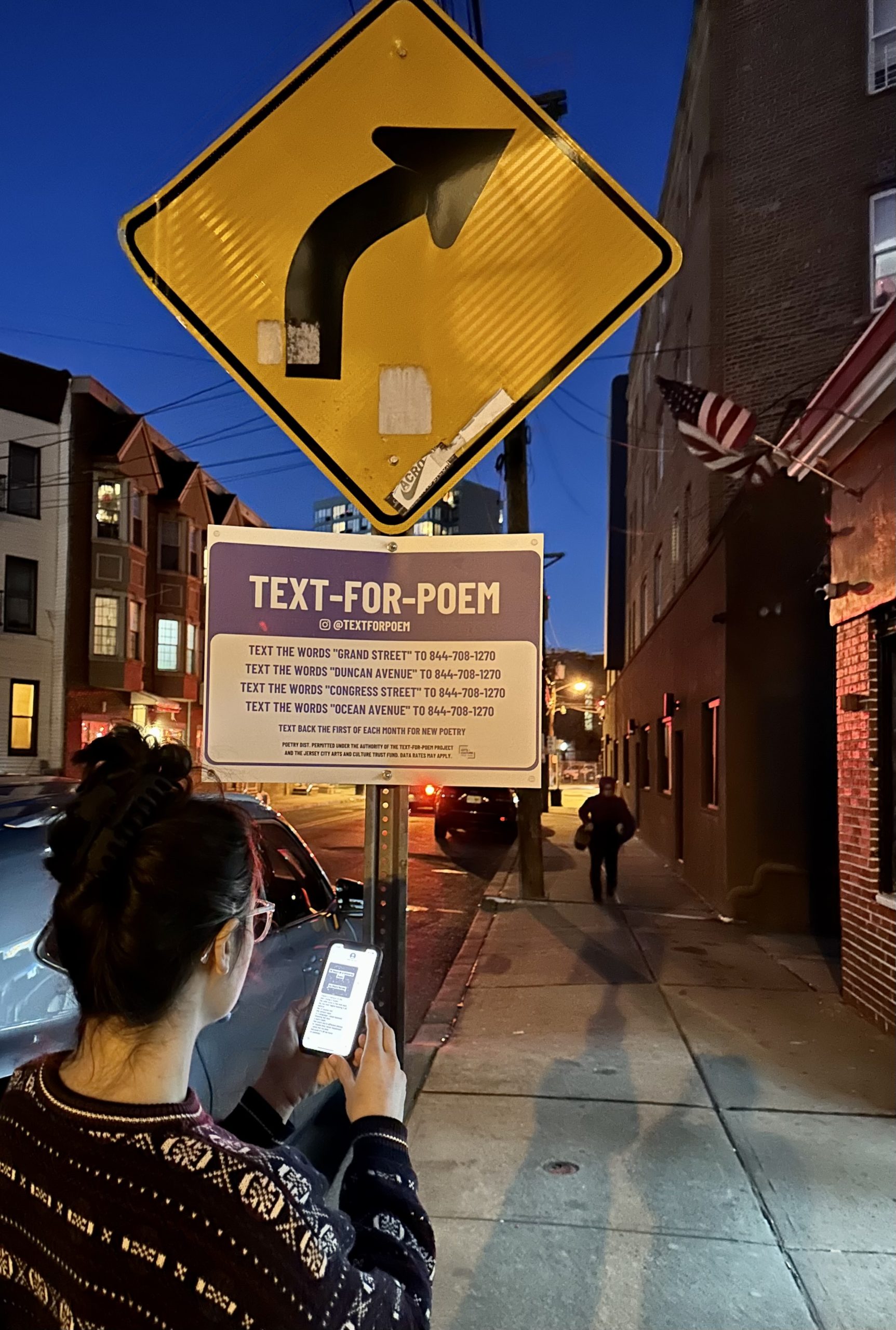Photo courtesy of Benedicto Figueroa.
If you live in the Jersey City area, you may have come across conspicuous purple signs engraved with the words “Text-for-Poem.” These industrial signs have been on display in different wards since November on bus stops and parks like Ferris Triangle Park, Washington Park, Canco Park and others.
What may look like an ad sign for a moving company is actually part of a literary art project created by Benedicto Figueroa, a poet, Arts Director of Smush Gallery and resident of Jersey City.
As the name suggests, texting the number on the sign delivers a poem straight to your phone, each month bringing a fresh batch, with a different poem linked to each location. The project is scheduled to run for nine months.
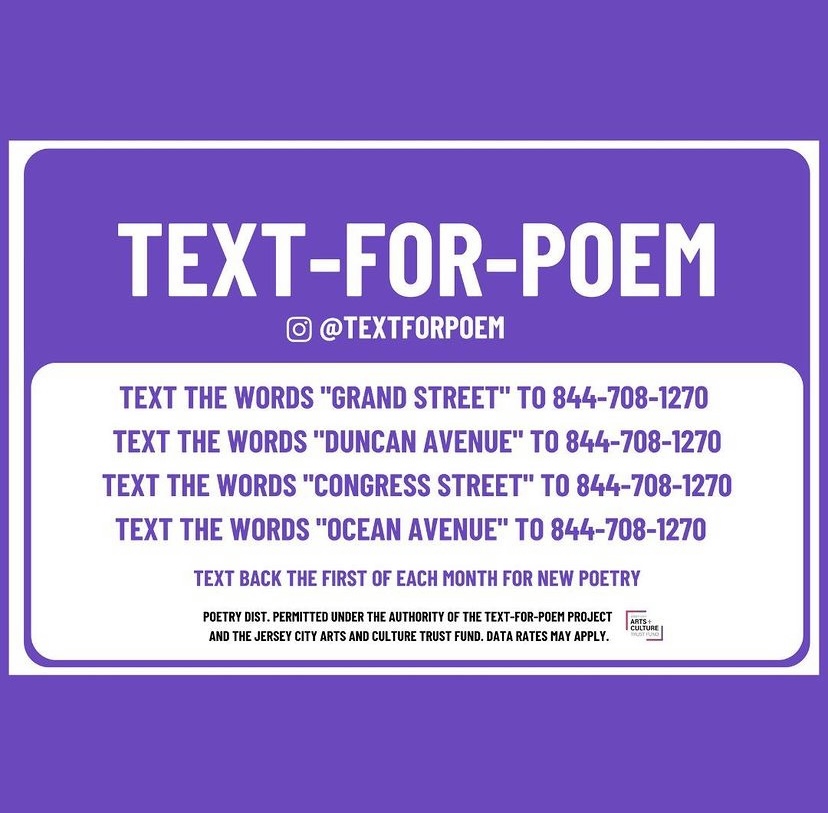
Figueroa launched the Text-for-Poem project in November 2023, as an extension of an immersive literary installation he put together last year at Smush Gallery, which he describes as a “very weird art show where all of the pieces of art were a poem.”
The installation featured pieces like magic puzzles that needed solving, video pieces, audio recordings, which all had one thing in common: they were poems. There was also a call-in-line that people could call to listen to voice actors reading poems. Other prominent artists like Alejandro Hernandez and Rachel Wiley were also featured in the project.
“It’s a challenge and I think it is our duty as artists and creatives to think of new ways to bring art to the community,” Figueroa told Slice of Culture. “We rely on the audience and the people. We’re just creating some stuff for ourselves if we don’t approach the arts with a lot of love for the people who are consuming it.”
As the installation ended and he was left with the dying parts of the show, Figueroa started thinking about how to use the successful parts of the installation to benefit as many people as possible. This led to the creation of Text-for-Poem, which Figueroa envisioned as an ongoing project that would showcase beautiful poetry of a large and incredibly diverse group of poets.
“It is very important to take the literary arts out of the academic halls and classrooms – even art galleries, which a lot of the time intimidate people,” he said. “There are a lot of people that love the arts and poetry and who are intimidated by going to these spaces that they feel don’t belong to them or they’re not familiar with.”
“I think it’s important to take these things out of those spaces and put them in spaces where people don’t expect to encounter them, like a bus stop,” he adds. “You don’t have to talk to anybody to walk through the doors of an unfamiliar space. You don’t have to go anywhere that you weren’t already going.”
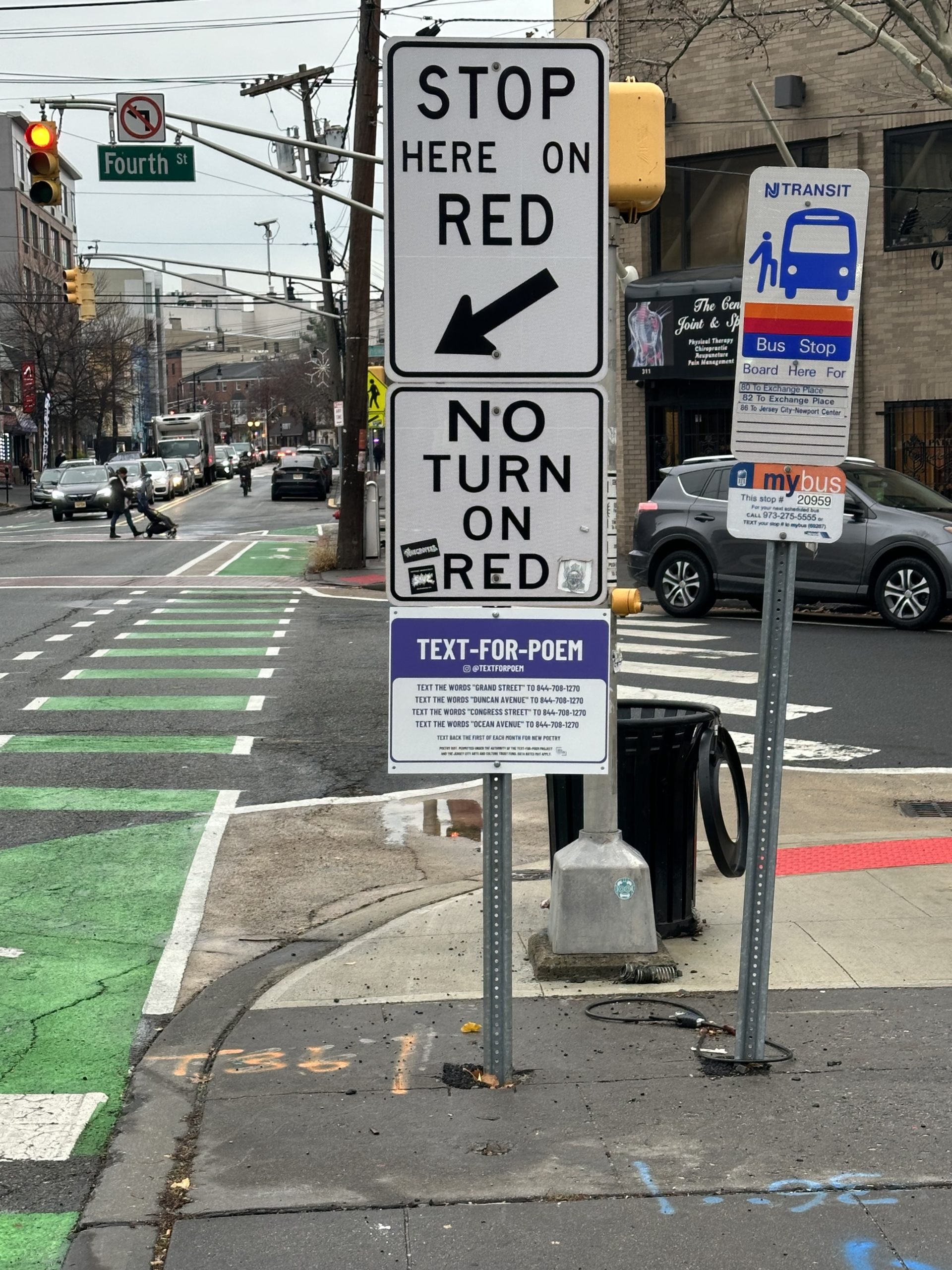
Figueroa chose the text format for the project because he found it a lot more accessible.
“If a person has hearing issues they can still read the poem,” he says. “If they have a problem with their sights, they can have their screen reader read their poem for them.”
The project got submissions from all over the country.
“We got poetry from people like Kavitha Dulai who lives in California,” Figuoera said. “We have a poem by Rachel Wiley, who was living in Ohio at the time [and is] an amazing poet and a stonewall recipient. We got a poem from Danny, a person who submitted the first poem he ever wrote. All these people live in this project together.”
Eventually, the project will feature students from the St. Joseph’s school for the blind and other folks with disabilities.
To turn his vision into a reality, Figueroa was able to secure a $17,500 grant from the Jersey City Arts Fund.
“It seems like a lot until you start putting together a project,” Figueroa said. “The Majority of the grant is written in a very specific way to create a direct public benefit for the people of Jersey City.”
For the most part, Figueroa put together the entire project alone, with the help of his partner. He got the grant from the city but didn’t necessarily have permission from the city or state to put the signs on public poles.
“From graphics to design, to the physical labor of actually running around the city and putting up these signs where they wouldn’t be destroyed,” he told us. “It’s been a learning experience.”
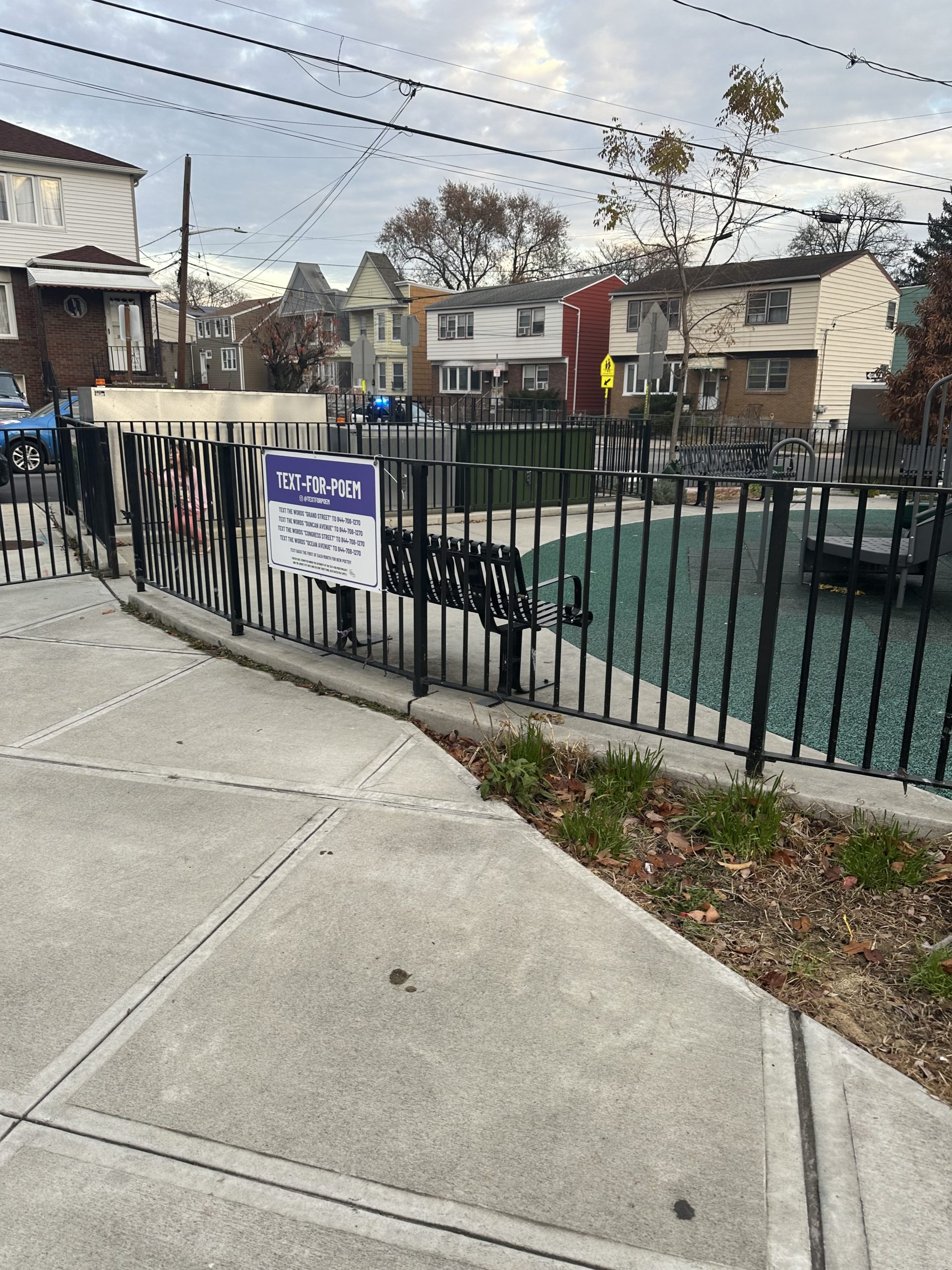
Figueroa hails from Puerto Rico and was raised in a big Latino community in Union City. In addition to being the poet laureate for Union City for several years, Figueroa has been doing a lot of art work and art programming as the Artistic Director at the Smush gallery.
Smush gallery, which will celebrate its sixth anniversary this year, brings together a strong and diverse community of artists by hosting all sorts of arts events – poetry open mics, dance performances, seasonal community potlucks and more.
So far, the Text-for-Poem project seems to have garnered a positive response, with many locals snapping pictures of the sign and tagging the project’s instagram page.
Kavitha Dulai, a 49 year old nonprofit consultant and current Bay Area resident who has lived in Jersey City for many years and still has strong ties with the community, says the project felt like a great way to engage the public in really understanding the purpose of art in everyday life.
“We rely on art so much everyday and people take it for granted,” said Dulai.
Dulai has been writing poetry since she was a child. She has published in small journals and hopes to have a book published one day. She writes about the immigrant experience, about her parents’ experience who moved to America in the 1950’s from South Asia and about her experience growing up in America in the 70’s. She also writes about grief and love.
“Poetry and fiction writing is what keeps me going,” she said.
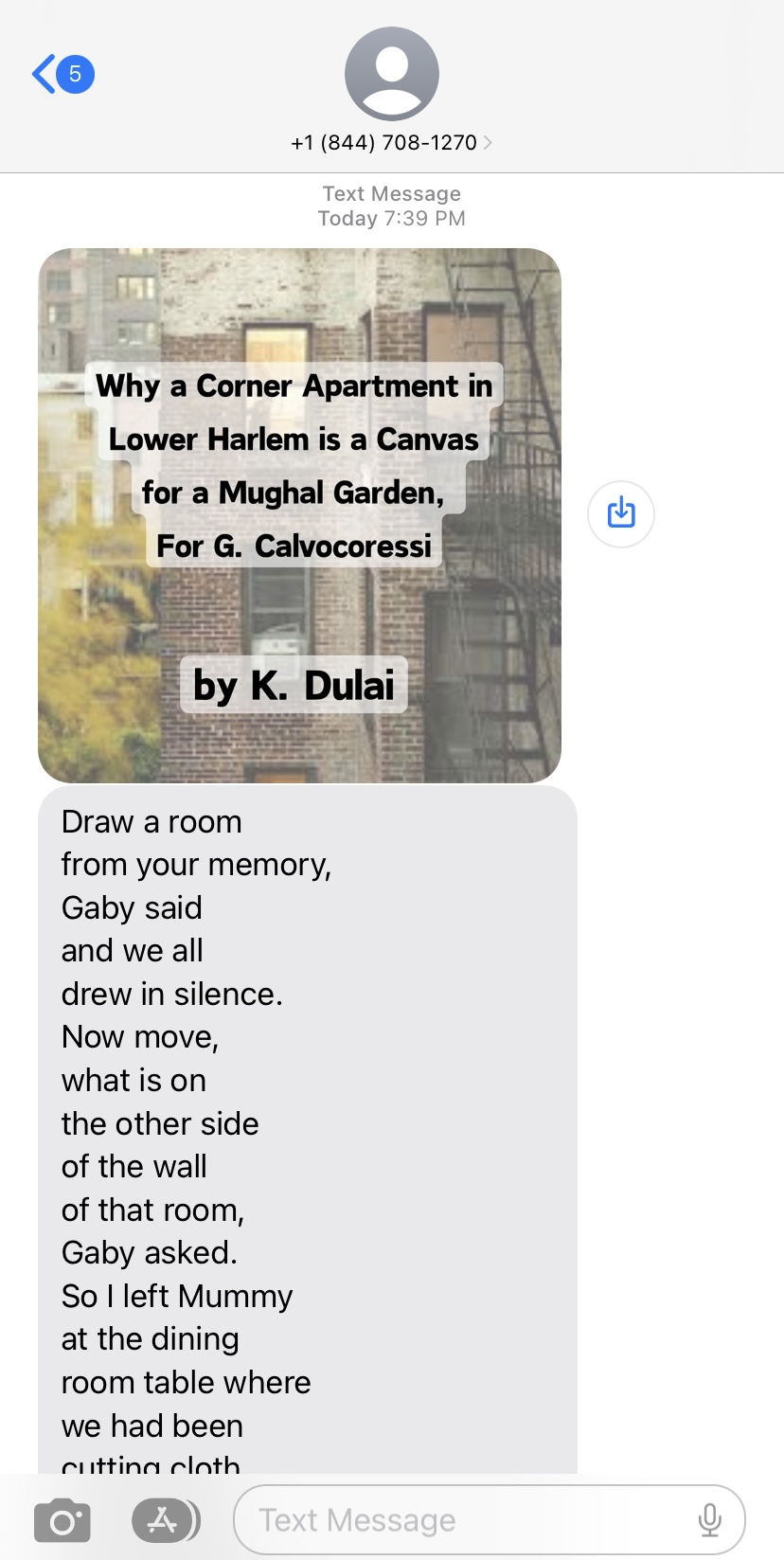
Living on this side of the Hudson in Jersey City, Dulai took inspiration from the river and the city.
“I had some of the best years of my life living as an artist, creating and working there and I miss it,” she said. “The community was extremely supportive.”
Dulai said the arts are an essential part of the human experience.
“We rely on the arts to get us through tough times. We turn to the arts when we want to celebrate things,” she said. “Sometimes society’s priorities shift and there isn’t a lot of funding for it. People don’t realize making art is labor.”
“Art can serve as a powerful platform for advocacy for causes that need amplification,” she added.
The Text-for-Poem project will culminate with in-person readings and more opportunities for the people to engage with the poets in real life and the poetry itself. Figueroa hopes to keep this project going, to keep people engaged and to share beautiful poetry with as many people as possible.

